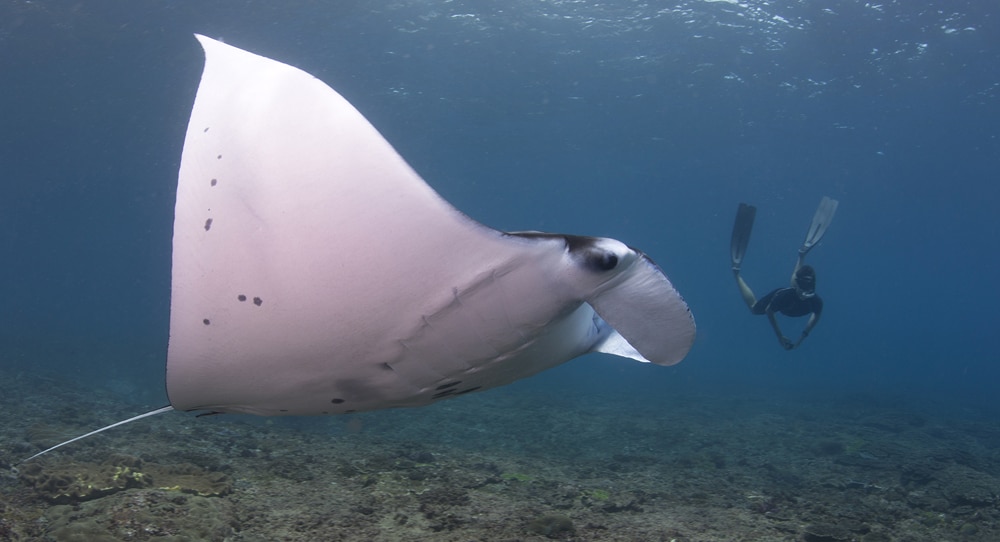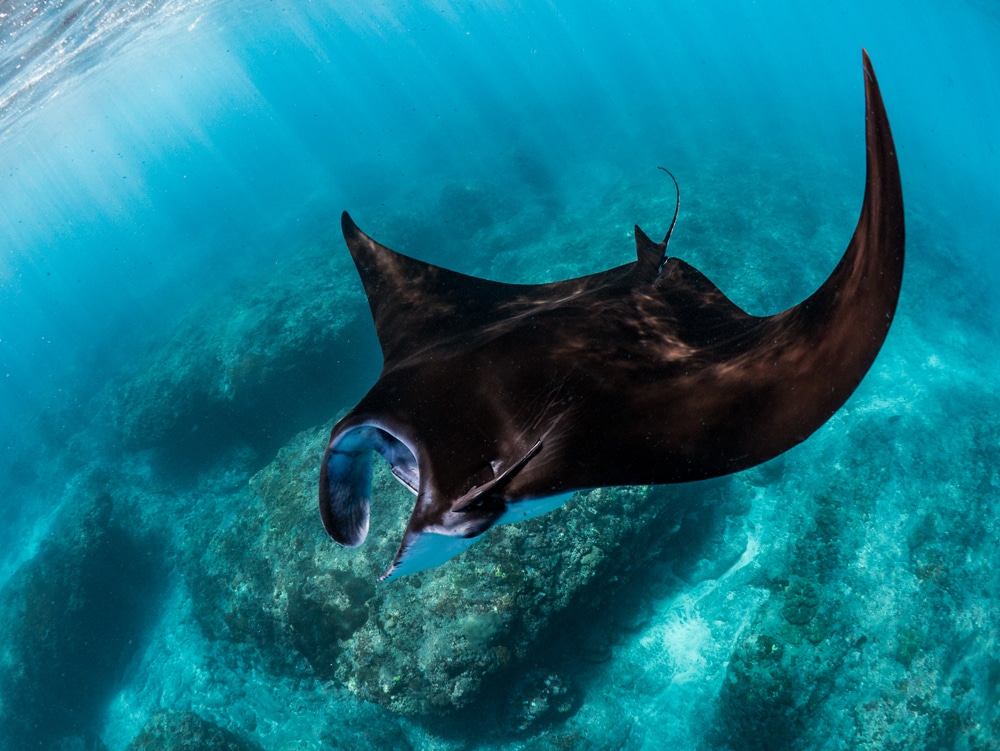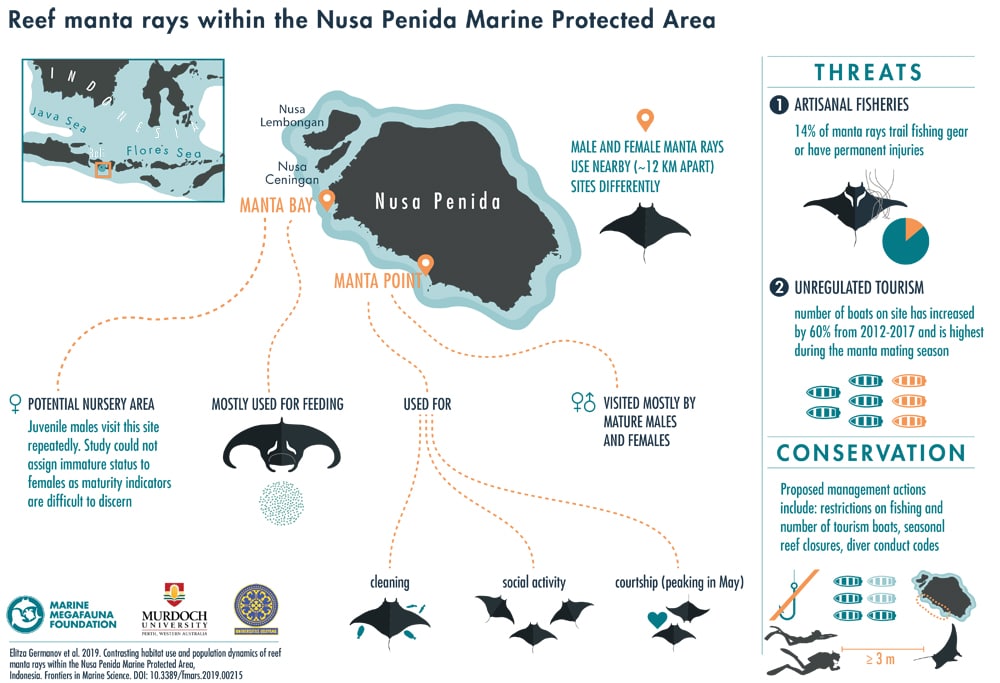Marine Life & Conservation
Tourists key to future of rare manta nursery

 Scientists from the Marine Megafauna Foundation and Murdoch University are reporting a large number of juvenile manta rays in the waters of Nusa Penida, a small island 18km southeast of Bali, suggesting the area may be a nursery for this threatened species.
Scientists from the Marine Megafauna Foundation and Murdoch University are reporting a large number of juvenile manta rays in the waters of Nusa Penida, a small island 18km southeast of Bali, suggesting the area may be a nursery for this threatened species.
Reef mantas (Mobula alfredi), which grow up to 5m, tend to reside and feed in shallow, coastal habitats. They also visit ‘cleaning stations’ on coral reefs to have parasites or dead skin picked off by small fish. In Nusa Penida, they are present year-round making the Marine Protected Area (MPA) a snorkeling and diving hotspot.
One of the popular dive sites (Manta Bay) described in this new study is predominantly frequented by juvenile males looking for food. Some are as small as 1.5m in disc width on first sighting, providing strong evidence that the site forms part of a nursery habitat and foraging ground for the local reef manta population. Most individuals have been seen repeatedly across multiple years.
“Where manta rays are born and grow up still baffles us. Our research in Indonesia suggests there might be a reef manta nursery in the Nusa Penida area and possibly also in the famous Raja Ampat archipelago”, said lead author Elitza Germanov. “It’s really important for us to know where these nurseries are. They provide a safe space for young, vulnerable manta rays to grow and develop away from the reach of predators.”
Interestingly, mature males and females seem to prefer Manta Point, a second dive site a mere 12 km away. Here, the manta rays are mostly observed visiting cleaning stations and engaging in social activity as well as courtship display during the mating season (peaking in May).
Nusa Penida attracts more than 200,000 tourists each year. Of the 11 main dive spots in these waters, Manta Bay and Manta Point are frequented most by tourism operators, putting the local manta ray population under increasing pressure. While manta rays are protected in Indonesia2, there are currently few regulations in place to manage the growing tourism industry. The number of boats allowed to enter manta ray habitats is not limited and codes of conduct for manta ray interactions are voluntary. The average annual number of boats present at the two manta ray sites has increased by 60% since 2012 and tourism is highest during the mating season.
Germanov commented: “Large diving groups and boat engine noise can cause chronic stress to these vulnerable animals. Tourists may disrupt the foraging, cleaning and mating behavior of manta rays if they get too close, which can have serious implications for their growth and fitness.”
Limiting the number of tourism vessels allowed at one time and making codes of conduct for diving and snorkeling with manta rays mandatory are proposed as a way to minimize the impact from tourism. Seasonal closure of Manta Point could also be considered to protect the manta rays from disturbance during the mating period.
Artisanal fishing poses a further threat to the local population. During the study, 14% of manta rays were either trailing hooks and lines or had injuries and even amputations from fishing gear cutting through their skin and cartilage skeleton. While all fishing activities are officially prohibited in both Manta Bay and Manta Point, the whole west coast of Nusa Penida could be closed off as a precautionary measure.
Dr Andrea Marshall, principal scientist and co-founder of the Marine Megafauna Foundation said: “This is clearly an important habitat for reef mantas. In fact, the resighting rates in the Nusa Penida MPA are higher than anywhere else in the world.
“The two aggregation sites are very close to each other but used for different purposes. We still don’t know much about when and how the mantas move between the feeding, cleaning and mating grounds. Putting the pieces of this puzzle together will help us figure out how to protect these slow-growing animals.”
For more information about the work of the Marine Megafauna Foundation visit their website by clicking here.
Marine Life & Conservation
Paul Watson Released as Denmark Blocks Japan’s Extradition Bid

Renowned anti-whaling activist Paul Watson has been released from custody in Greenland after spending five months in detention. Denmark’s Justice Ministry rejected Japan’s request for his extradition, citing insufficient guarantees that his time already served in custody would be credited against any potential sentence.
The 74-year-old Canadian-American was arrested on July 21 in Nuuk, Greenland’s capital, when his ship docked to refuel. His arrest was based on a 2012 Japanese warrant related to a 2010 encounter in Antarctic waters. Japan alleged Watson obstructed operations and caused damage to a whaling research ship during efforts to disrupt illegal whaling. Watson has consistently denied these claims, maintaining his commitment to marine conservation.
Denmark, which oversees extradition matters for Greenland, concluded that while the legal conditions for extradition were met, the lack of assurances from Japan regarding time-served credit made extradition untenable.
In a video shared by his foundation, Watson expressed gratitude and relief, saying, “After five months, it’s good to be out… and good to know they’re not sending me to Japan.” He added that the most difficult part of his time in custody was being separated from his two young sons.
Watson is a pioneering figure in marine conservation, known for founding the Captain Paul Watson Foundation in 2022 after decades of activism with the Sea Shepherd Conservation Society. His bold efforts to defend marine life have earned him widespread support, including from celebrities and conservationists. His work has also been featured in the acclaimed reality TV series Whale Wars.
Watson’s lawyer, Jonas Christoffersen, praised the decision, stating, “We are happy and relieved that Paul Watson is now free.” He added that Watson is eager to reunite with his family and continue his vital work.
The arrest occurred while Watson’s vessel, the M/Y John Paul DeJoria, was en route to the North Pacific with a team of 26 volunteers to intercept a Japanese whaling ship. His foundation described the arrest as politically motivated and emphasized that Watson’s actions were focused on ending illegal whaling practices.
Japan resumed commercial whaling in 2019 after leaving the International Whaling Commission, asserting that whale meat is a cultural tradition. Conservationists, however, continue to challenge these practices, highlighting their impact on marine ecosystems.
Despite the challenges, Watson remains steadfast in his mission to protect marine life and bring attention to whaling practices. His dedication to ocean conservation has made him a globally respected advocate for the environment.
Marine Life & Conservation
12 Days of Zero-Waste Fish-mas

This holiday period, the Marine Conservation Society, the UK’s leading ocean membership charity, invites you to make some simple changes to eating fish this Christmas to help our seas.
Dr Kenneth Bodles, Head of Fisheries and Aquaculture at the Marine Conservation Society, said, “During the festive season, our consumption increases, but so does waste. Sustainability isn’t just about where food comes from – it’s also about how you use it. By reducing waste and making the most out of your seafood, you’re not only taking steps to be more ocean-friendly, but can also help to cut costs during what is often one of the most expensive times of the year”.
The Marine Conservation Society has compiled twelve tips on how to consume seafood sustainably with zero-waste this Christmas:
Buy whole fish instead of fillets
Instead of fillets, consider buying whole fish such as salmon, hake, or lemon sole. By adopting a “nose to tail” approach with cooking, whole-baked fish not only feeds a crowd, but also helps to minimise waste and maximise sustainability by using up every part of the animal, including bones, skin, and fat.
Make fish stock
Leftover fish bones or shells can be put to good use by boiling them to make a nourishing fish stock or bisque. This can be frozen and preserved for later use and makes for a flavourful base in a soup.
Make your own fish pâté
Avoid waste by turning leftover fish, such as smoked mackerel or salmon, into a delicious pâté by blending with cream cheese and lemon. Perfect when paired with crackers.
The sustainability of salmon and mackerel varies depending on where and how it is caught or farmed. For more information on green-rated options, check the charity’s Good Fish Guide.
Buy frozen
By purchasing seafood that is frozen or vacuum-packed, this helps to reduce waste by extending the shelf life of your food.
Fish pie
If you’re wondering what to do with leftover cooked fish, why not opt for a classic fish pie with mashed potatoes, leeks, and a cheesy sauce? A sure crowd pleaser on Boxing Day.
Use the head
Don’t forget the fish head! The meat is incredibly tender and flavourful. The charity recommends a cod’s head curry or recreating Fallow’s renowned cod’s head in siracha butter.
By stretching your ingredients further, not only is this a more sustainable way to enjoy seafood, but also cost-effective by repurposing leftovers and cooking creatively.
Boxing Day brunch
Mix leftover kippers or smoked salmon with scrambled eggs for a tasty, zero-waste, Boxing Day brunch.
For best choice, make sure you buy kippers, or herring, from the North Sea and the North Irish Sea.
Zero-waste storage
A top tip from the Marine Conservation Society to avoid waste is freezing fish offcuts to save for future use.
Crisp up the skin
Even leftover fish skin can be turned into a quick savoury snack by crisping it up in an air fryer with a little olive oil and salt.
Anchovies two ways
Leftover anchovies can either be blended with butter to make a delicious anchovy butter or tossed into pasta for a hit of umami flavour.
The charity recommends opting for anchovies caught in the Bay of Biscay for best choice.
Fishcakes
For an easy, zero-waste meal, leftover seafood trimmings can be mixed with mash and fried in breadcrumbs to make fishcakes.
Pickled mussels
Try pickling mussels in 1:1 vinegar and water, with a dash of sugar for a sustainable, zero-waste snack that can be enjoyed well beyond the festive season.
Mussels farmed in the UK are a seafood superhero. Grown using low-impact methods and harvested by hand, they get all the food they need from the sea around them. This makes them one of the most sustainable, ocean-friendly, and cost-effective seafood options.
Players of People’s Postcode Lottery have raised £6.6M towards the Marine Conservation Society’s vital work in making seafood more sustainable.
Laura Chow, Head of Charities at People’s Postcode Lottery, said: “Fish is a festive favourite for many, but making sustainable choices when it comes to how we buy and eat seafood makes all the difference for our ocean. Support from players of People’s Postcode Lottery has helped the Marine Conservation Society further its sustainable seafood work, so that we can all enjoy healthier, better protected seas.”
The Marine Conservation Society encourages you to make sustainable seafood choices a year-round habit, not just for Christmas. To check how sustainable the seafood on your plate is, you can visit the charity’s Good Fish Guide. The Guide helps consumers and businesses identify the most sustainable seafood using a simple traffic light system, based on where and how species are caught or farmed. Green is the best choice, amber means improvements are needed, and red indicates fish to avoid buying.
Zero-waste gift idea
Why not embrace a zero-waste Christmas by gifting a membership to support marine conservation? It’s a meaningful, low-waste gift that helps protect our ocean for generations to come. Memberships start from as little as £5 a month – the price of a sandwich and drink from your local coffee shop.
Find the latest sustainable seafood advice for wild-caught and farmed seafood on the Good Fish Guide, downloadable to your phone from www.mcsuk.org/goodfishguide.
-

 News2 months ago
News2 months agoIconic SS United States to become the World’s Largest Artificial Reef
-

 News3 months ago
News3 months agoBook Review – 52 Assignments: Underwater Photography
-

 Gear News3 months ago
Gear News3 months agoDYNAMICNORD – New German diving brand enters the British market
-

 News3 months ago
News3 months agoExploring Cenote El Pit: A Diver’s Dream
-

 Gear News3 months ago
Gear News3 months agoTry BARE drysuits (and maybe even win one!) this Friday with Sea & Sea at North West Dive Fest
-

 Marine Life & Conservation3 months ago
Marine Life & Conservation3 months agoBook Review: Coral Triangle Cameos
-

 Blogs2 months ago
Blogs2 months agoDive the Egyptian Red Sea this Autumn with Regaldive
-

 News3 months ago
News3 months ago2024 Ocean Art Underwater Photo Competition Announced





